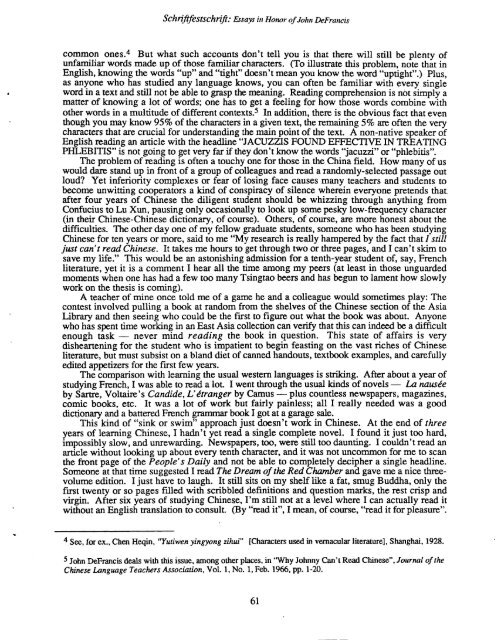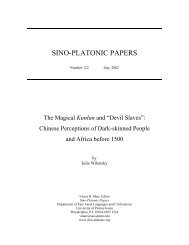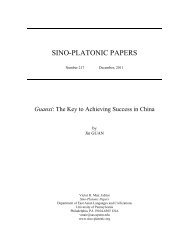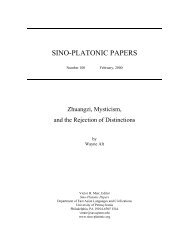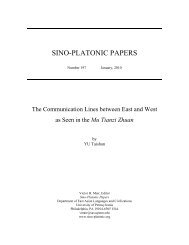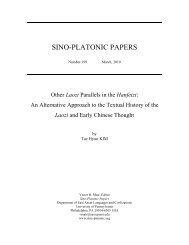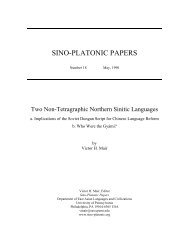Essays on Writing and Language in Honor - Sino-Platonic Papers
Essays on Writing and Language in Honor - Sino-Platonic Papers
Essays on Writing and Language in Honor - Sino-Platonic Papers
You also want an ePaper? Increase the reach of your titles
YUMPU automatically turns print PDFs into web optimized ePapers that Google loves.
Schnfrfesischchrifi: Ersa~ <strong>in</strong> H<strong>on</strong>or of John DeFrar~cis<br />
comm<strong>on</strong> <strong>on</strong>es.4 But what such accounts d<strong>on</strong>'t tell you is that there will still be plenty of<br />
unfamiliar words made up of those familiar characters. (To illustrate this problem, note that <strong>in</strong><br />
English, know<strong>in</strong>g the words "up" <strong>and</strong> "tight" doesn't mean you know the word "uptight".) Plus,<br />
as any<strong>on</strong>e who has studied any language knows, you can often be familiar with every s<strong>in</strong>gle<br />
word <strong>in</strong> a text <strong>and</strong> still not be able to grasp the mean<strong>in</strong>g. Read<strong>in</strong>g comprehensi<strong>on</strong> is not simply a<br />
matter of know<strong>in</strong>g a lot of words; <strong>on</strong>e has to get a feel<strong>in</strong>g for how those words comb<strong>in</strong>e with<br />
other words <strong>in</strong> a multitude of different c<strong>on</strong>texts? In additi<strong>on</strong>, there is the obvious fact that even<br />
though you may know 95% of the characters <strong>in</strong> a given text, the rema<strong>in</strong><strong>in</strong>g 5% are often the very<br />
characters that are crucial for underst<strong>and</strong><strong>in</strong>g the ma<strong>in</strong> po<strong>in</strong>t of the text. A n<strong>on</strong>-native speaker of<br />
English read<strong>in</strong>g an article with the headl<strong>in</strong>e "JACUZZIS FOUND EFFECTIVE IN TREATING<br />
PHLEBITIS" is not go<strong>in</strong>g to get very far if they d<strong>on</strong>'t how the words "jacuzzi" or "phlebitis".<br />
The problem of read<strong>in</strong>g is often a touchy <strong>on</strong>e for those <strong>in</strong> the Ch<strong>in</strong>a field. How many of us<br />
would dare st<strong>and</strong> up <strong>in</strong> fr<strong>on</strong>t of a group of colleagues <strong>and</strong> read a r<strong>and</strong>omly-selected passage out<br />
loud? Yet <strong>in</strong>feriority complexes or fear of los<strong>in</strong>g face causes many teachers <strong>and</strong> students to<br />
become unwitt<strong>in</strong>g cooperators a k<strong>in</strong>d of c<strong>on</strong>spiracy of silence where<strong>in</strong> every<strong>on</strong>e pretends that<br />
after four years of Ch<strong>in</strong>ese the diligent student should be whizz<strong>in</strong>g through anyth<strong>in</strong>g from<br />
C<strong>on</strong>fucius to Lu Xun, paus<strong>in</strong>g <strong>on</strong>ly occasi<strong>on</strong>ally to look up some pesky low-frequency character<br />
(<strong>in</strong> their Ch<strong>in</strong>ese-Ch<strong>in</strong>ese dicti<strong>on</strong>ary, of course). Others, of course, are more h<strong>on</strong>est about the<br />
difficulties. The other day <strong>on</strong>e of my fellow graduate students, some<strong>on</strong>e who has been study<strong>in</strong>g<br />
Ch<strong>in</strong>ese for ten years or more, said to me "My research is really hampered by the fact that I still<br />
just can't read Ch<strong>in</strong>ese. It takes me hours to get through two or three pages, <strong>and</strong> I can't skim to<br />
save my life." This would be an ast<strong>on</strong>ish<strong>in</strong>g admissi<strong>on</strong> for a tenth-year student of, say, French<br />
literature, yet it is a comment I hear all the time am<strong>on</strong>g my peers (at least <strong>in</strong> those unguarded<br />
moments when <strong>on</strong>e has had a few too many Ts<strong>in</strong>gtao beers <strong>and</strong> has begun to lament how slowly<br />
work <strong>on</strong> the thesis is com<strong>in</strong>g).<br />
A teacher of m<strong>in</strong>e <strong>on</strong>ce told me of a game he <strong>and</strong> a colleague would sometimes play: The<br />
c<strong>on</strong>test <strong>in</strong>volved pull<strong>in</strong>g a book at r<strong>and</strong>om from the shelves of the Ch<strong>in</strong>ese secti<strong>on</strong> of the Asia<br />
Library <strong>and</strong> then see<strong>in</strong>g who could be the first to figure out what the book was about. Any<strong>on</strong>e<br />
who has spent time work<strong>in</strong>g <strong>in</strong> an East Asia collecti<strong>on</strong> can venfy that this can <strong>in</strong>deed be a dfficult<br />
enough task - never m<strong>in</strong>d read<strong>in</strong>g the book <strong>in</strong> questi<strong>on</strong>. This state of affairs is very<br />
dishearten<strong>in</strong>g for the student who is impatient to beg<strong>in</strong> feast<strong>in</strong>g <strong>on</strong> the vast riches of Ch<strong>in</strong>ese<br />
literature, but must subsist <strong>on</strong> a bl<strong>and</strong> diet of canned h<strong>and</strong>outs, textbook examples, <strong>and</strong> carefully<br />
edited appetizers for the first few years.<br />
The comparis<strong>on</strong> with learn<strong>in</strong>g the usual western languages is strik<strong>in</strong>g. After about a year of<br />
study<strong>in</strong>g French, I was able to read a lot I went through the usual k<strong>in</strong>ds of novels - La nnuske<br />
by Sartre, V01~'s C<strong>and</strong>ide, L'btranger by Camus - plus countless newspapers, magaz<strong>in</strong>es,<br />
comic books, etc. It was a lot of work but fairly pa<strong>in</strong>less; all I really needed was a good<br />
dicti<strong>on</strong>ary <strong>and</strong> a battered French grammar book I got at a garage sale.<br />
This k<strong>in</strong>d of "s<strong>in</strong>k or swim" approach just doesn't work <strong>in</strong> Ch<strong>in</strong>ese. At the end of three<br />
years of learn<strong>in</strong>g Ch<strong>in</strong>ese, I hadn't yet read a s<strong>in</strong>gle complete novel. I found it just too hard,<br />
impossibly slow, <strong>and</strong> unreward<strong>in</strong>g. Newspapers, too, were still too daunt<strong>in</strong>g. I couldn't read an<br />
article without look<strong>in</strong>g up about every tenth character, <strong>and</strong> it was not uncomm<strong>on</strong> for me to scan<br />
the fr<strong>on</strong>t page of the People's Daily <strong>and</strong> not be able to completely decipher a s<strong>in</strong>gle headl<strong>in</strong>e.<br />
Some<strong>on</strong>e at that time suggested I read The Dream of the Red Chamber <strong>and</strong> gave me a nice threevolume<br />
editi<strong>on</strong>. I just have to laugh. It still sits <strong>on</strong> my shelf like a fat, smug Buddha, <strong>on</strong>ly the<br />
first twenty or so pages frlled with scribbled def<strong>in</strong>iti<strong>on</strong>s <strong>and</strong> questi<strong>on</strong> marks, the rest crisp <strong>and</strong><br />
virg<strong>in</strong>. After six years of study<strong>in</strong>g Ch<strong>in</strong>ese, I'm still not at a level where I can actually read it<br />
without an English translati<strong>on</strong> to c<strong>on</strong>sult. (By "read it", I mean, of course, "read it for pleasure".<br />
See, for ex., Chen Heg<strong>in</strong>, "Yutiwen y<strong>in</strong>gy<strong>on</strong>g zihui" [Characters used <strong>in</strong> vernacular literature], Shanghai, 1928.<br />
John DeFrancis deals with this issue, am<strong>on</strong>g other places, <strong>in</strong> 'Why Johnny Can't Read Ch<strong>in</strong>ese", Jourml of the<br />
Ch<strong>in</strong>ese <strong>Language</strong> Teachers Associati<strong>on</strong>, Vol. 1, No. 1, Feb. 1966, pp. 1-20.


